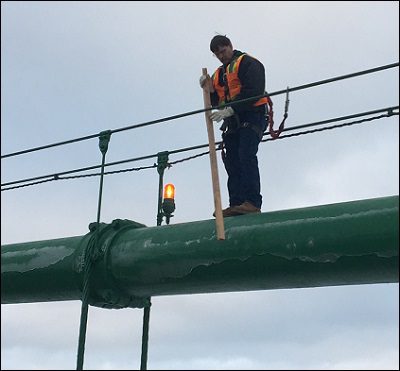Michigan’s Mackinac Bridge Authority recently turned to steeplejacks to climb up the cables of the iconic structure and chip away ice that led to a series of traffic closures.
“Sheets and chunks of ice falling hundreds of feet from the bridge towers and cables have the potential to severely damage vehicles and injure or kill passengers in them,” the authority said. It added that crews monitor bridge conditions throughout any closure, both by going out on the bridge and through the MBA’s network of cameras located across the span.
The bridge authority’s board includes Michigan Department of Transportation Director Kirk Steudle.
The agency said that on Feb. 24, “during the weekend’s first closure, MBA steeplejacks were able to scale the main cables and knock some loose ice off, enough to reopen the bridge. That was only possible this time because the ice was on the sides and bottom of the cable, not the top where they were walking.”
However, “though MBA staff attempted to loosen some of the remaining ice on the bridge by driving loaded sand trucks across the bridge, ice remained on the main cables and towers.”
It closed the bridge again the next morning due to falling ice for about four hours, but kept it closed to high-profile vehicles due to high winds until fully reopening it to traffic about 5 p.m.
But based on predicted sunny and warmer weather, it warned Feb. 26 that the remaining ice could be falling from the bridge in coming days.
“It’s impossible to say exactly when the ice could start falling from the bridge again, though predicted conditions make it likely it will begin falling soon,” said MBA Executive Secretary Bob Sweeney.
“The last few years, freezing rain and midwinter warm-ups have been more frequent, and we’ve had more closures for falling ice,” Sweeney said. “Though it is getting to be more common, we still can’t reliably predict when it will occur, or how long these closures will last.”

